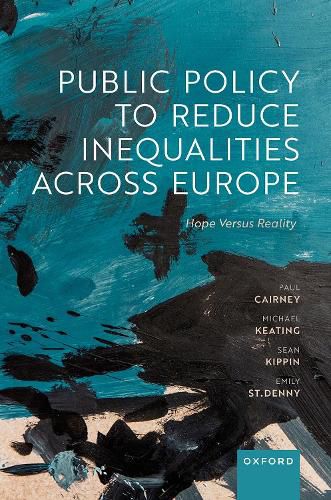Readings Newsletter
Become a Readings Member to make your shopping experience even easier.
Sign in or sign up for free!
You’re not far away from qualifying for FREE standard shipping within Australia
You’ve qualified for FREE standard shipping within Australia
The cart is loading…






This is an open access title available under the terms of a CC BY-NC-ND 4.0 International licence. It is free to read at Oxford Scholarship Online and offered as a free PDF download from OUP and selected open access locations.
There is a broad consensus across European states and the EU that social and economic inequality is a problem that needs to be addressed. Yet inequality policy is notoriously complex and contested. This book approaches the issue from two linked perspectives. First, a focus on functional requirements highlights what policymakers think they need to deliver policy successfully, and the gap between their requirements and reality. We identify this gap in relation to the theory and practice of policy learning, and to multiple sectors, to show how it manifests in health, education, and gender equity policies. Second, a focus on territorial politics highlights how the problem is interpreted at different scales, subject to competing demands to take responsibility. This contestation and spread of responsibilities contributes to different policy approaches across spatial scales. We conclude that governments promote many separate equity initiatives, across territories and sectors, without knowing if they are complementary or contradictory. This outcome could reflect the fact that ambiguous policy problems and complex policymaking processes are beyond the full knowledge or control of governments. It could also be part of a strategy to make a rhetorically radical case while knowing that they will translate into safer policies. It allows them to replace debates on values, regarding whose definition of equity matters and which inequalities to tolerate, with more technical discussions of policy processes. Governments may be offering new perspectives on spatial justice or new ways to reduce political attention to inequalities.
$9.00 standard shipping within Australia
FREE standard shipping within Australia for orders over $100.00
Express & International shipping calculated at checkout
This is an open access title available under the terms of a CC BY-NC-ND 4.0 International licence. It is free to read at Oxford Scholarship Online and offered as a free PDF download from OUP and selected open access locations.
There is a broad consensus across European states and the EU that social and economic inequality is a problem that needs to be addressed. Yet inequality policy is notoriously complex and contested. This book approaches the issue from two linked perspectives. First, a focus on functional requirements highlights what policymakers think they need to deliver policy successfully, and the gap between their requirements and reality. We identify this gap in relation to the theory and practice of policy learning, and to multiple sectors, to show how it manifests in health, education, and gender equity policies. Second, a focus on territorial politics highlights how the problem is interpreted at different scales, subject to competing demands to take responsibility. This contestation and spread of responsibilities contributes to different policy approaches across spatial scales. We conclude that governments promote many separate equity initiatives, across territories and sectors, without knowing if they are complementary or contradictory. This outcome could reflect the fact that ambiguous policy problems and complex policymaking processes are beyond the full knowledge or control of governments. It could also be part of a strategy to make a rhetorically radical case while knowing that they will translate into safer policies. It allows them to replace debates on values, regarding whose definition of equity matters and which inequalities to tolerate, with more technical discussions of policy processes. Governments may be offering new perspectives on spatial justice or new ways to reduce political attention to inequalities.